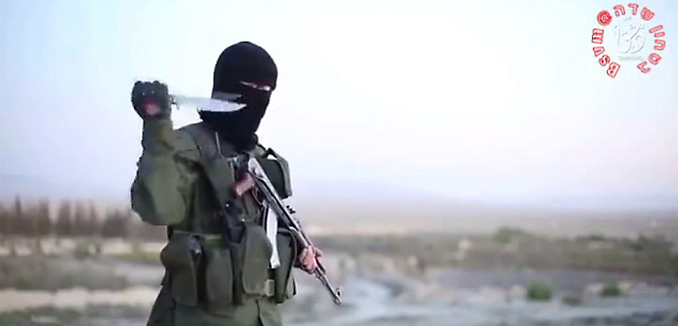The Islamic State of Iraq and Syria (ISIS) released a video of an armed and masked terrorist threatening Jews and Israel in fluent Hebrew this week, The Times of Israel reported Friday.
In the video, which is embedded below, the terrorist addressed the message from ISIS to all Jews, who he called the primary enemies of Muslims. According to the Times, his Hebrew was French-accented.
“We promise you that soon, not one Jew will be left [alive] in Jerusalem or across Israel and we will continue until we eradicate this disease [Judaism?] from the world,” he goes on.
“Look at what has happened to you in a few vehicular and stabbing attacks from our brothers in Palestine,” he mocked, in reference to the spate of recent attacks against Israeli civilians and security forces in Israel and the West Bank, in which at least 10 Israelis have been killed.
“You lost your minds and started fearing every driver that sped up. You were even scared of every person carrying something in their hand. What will happen to you when tens of thousands [of Muslim fighters] arrive from across the world to slaughter you?” he asks.
The terrorist went on to say that the Sykes-Picot agreement, which divided the Middle East into nation-states in the early 20th century, would not protect the Jews of Israel, and that ISIS would erase the borders of Jordan and Israel as it had with Iraq and Syria.
At the conclusion of the video, the terrorist pulled out a knife, recited a verse from the Koran, and promised victory to all Muslims.
Earlier this week, French philosopher Bernard-Henri Levy linked ISIS to the current wave of terror in Israel, observing that it bears “more resemblance to the latest installment of a worldwide jihad” than to a Palestinian “intifada.”
The terrorist who stabbed and shot victims in the Beersheba bus station on Sunday night was reportedly influenced by ISIS. The terror group released five videos earlier this week calling on Palestinians to continue attacking Jews, which they launched along with a social media campaign with the theme “Slaughter the Jews.”
In August, Israeli security forces arrested three individuals charged with plotting attacks for ISIS, with officials saying that over 40 Israeli citizens have already left the country to join the terror group in Syria and Iraq, according to The Times of Israel.
Gabriel Scheinmann, who wrote about the Sykes-Picot agreement referenced in the ISIS video in The Map That Ruined The Middle East, which was published in the July 2013 issue of The Tower Magazine, noted that the borders of the states it created “were determined neither by topography nor demography,” leading to instability.
While Scheinmann didn’t argue for undoing the agreement by fiat, he observed that “events on the ground” might well shape a new Middle East. Scheinmann tracked a number of changes that were affecting the region at the time.
Indeed, the Arab uprising has unleashed ethno-religious nationalism across the Middle East. The Syrian civil war has spawned ethnic conflict in Lebanon and Iraq, reawakening fears of civil war in both countries. Ethnic cleansing in coastal Syria has led to talk of creating “Alawistan,” an Alawite enclave that could eventually stretch into northern Lebanon and Turkey’s Hatay province. Disaffected Sunni Arabs in western Iraq may join with their brethren in a rump Syria and northern Lebanon if the Syrian rebels prove victorious. A Druze enclave could emerge in southern Syria, containing the nearly one million Lebanese and Syrian Druze. Even in Egypt, Sunni-Shiite tensions are boiling.
While these changes could take decades to play out, new entities have already taken their first steps toward independence. In 2011, South Sudan seceded along ethno-religious lines, marking the first internationally recognized change in the borders of a Middle Eastern state in nearly 80 years. Meanwhile, the downfall of the Qaddafi regime threatens to devolve power to Libya’s former city-states and has reawakened a long-repressed Berber movement that spans much of the North African Sahara. A Moroccan government minister recently spoke Amazigh, the Berber language, for the first time in parliament. In April 2012, the National Movement for the Liberation of Azawad declared the independence of northern Mali, setting in motion a French-led intervention to roll back the secession and restore Malian sovereignty.
[Photo: Ricky Ben-David / YouTube ]




